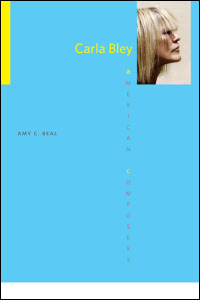 In November 2011 we published Carla Bley, the first extended treatment of this innovative composer. Author Amy Beal, a professor of music at the University of California, Santa Cruz, explains her approach to writing the book.
In November 2011 we published Carla Bley, the first extended treatment of this innovative composer. Author Amy Beal, a professor of music at the University of California, Santa Cruz, explains her approach to writing the book.
Q: Why did you decide to write a book on the work of Carly Bley?
A: Ever since I first heard Carla Bley’s monumental Escalator Over the Hill, I was fascinated by the radical originality of her music. I found it powerful, funny, perplexing, complex, expertly played by extraordinary musicians, and as compelling as any music I’ve ever encountered. More and more, I asked myself why, if I was researching and writing about “20th-century American music” and/or “American experimental music,” why couldn’t I write about Carla Bley? Exasperated by institutionalized categories of style, I wanted to establish the fact that she was a composer, not a “jazz composer,” or a “woman composer.” I am thrilled that this book is in UIP’s American Composers series, which places her side-by-side with John Cage, Lou Harrison, Elliott Carter, and several other (all-male, to date) composers.
Q: How accessible was Carle Bley in the research of this book?
A: Bley and her partner Steve Swallow were very supportive and helped me extensively in my research, as did Bley’s daughter Karen Mantler, and a number of other collaborators, including Michael Mantler, Charlie Haden, Gary Burton, Timothy Marquand, Gary Valente, and others. Though most of my research has been about living composers, this was the first time I focused entirely on the career of one artist—an intimidating task at best. I was grateful that Bley tolerated my many questions with patience and humor.
Q: Was it challenging to choose the elements of Bley’s life and work that would go into the book, and how did you decide what information was significant?
A: I consider myself first and foremost an old-fashioned historian concerned primarily with historical events and the music itself (and the circumstances of its creation, performance, and dissemination), so I decided not to dwell extensively on Bley’s private life. Though I wanted to establish the broad outlines of her biography, I aimed to focus on her music first, and her role in organizations such as the Jazz Composers Orchestra Association and New Music Distribution Service second. I was also interested in exploring Bley’s relationship to her instrument (piano), her integration of composed music and improvised music, and her vacillating ambivalence with regard to her relationship to jazz, rock, and classical music.
The list of Bley’s collaborators is long, and I also wanted to emphasize long-term shared projects with which she has been extensively involved, such as Charlie Haden’s Liberation Music Orchestra recordings, or her work with Paul Haines’s poetry. Universally praised as a gifted arranger, Bley’s work in this area deserves as much attention as her compositional work does. Further, I wanted to identify a few traits that make Bley’s music rather unique: her unabashed use of humor; her interest in untrained voices; theatricality; the juxtaposition of extreme simplicity with extreme virtuosity; and others. One of her most famous effects, which is both humorous and tongue-in-cheek-referential to musical situations, involves her band playing the same riff over and over, simulating a skipping record.
